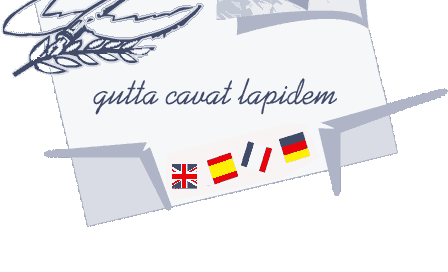Lessons from Genesis
Allegories contain many lessons. They challenge our imagination
with a spectrum of plausible interpretations. Indeed, the story
of Adam and Eve goes well beyond the apple (in a tropical garden
it may have been the passion fruit, a kiwi, a pomegranate, a cherimoya,
or even a mamey). We behold the human appetite for knowledge
and the distablizing dangers of discovery: Loss of innocence –
and of illusions.
We think of Prometheus, and of Goethe’s Dr. Faust. And, as
in Faust, God did not destroy his creation, but released the searching
human into the great adventure of ephemeral life, at the end of
which there is a promise of salvation (“wer immer strebend
sich bemüht, den können wir erlösen” Faust
II, 5 act, vers 11936).
The story of Cain and Abel is the story of man’s cruelty to
man (homo homini lupus). Four human beings on Earth. Adam, Eva,
Cain, Abel. And already one murder! Down to three. Violence at the
very doorstep of Paradise. It is also the parable of God speaking
directly to his creatures, to the criminal, as Jesus spoke to the
outcast, to the adulteress, to the Samaritan woman. These outcasts,
they too, are God’s creatures. No capital punishment yet.
No eye for an eye, tooth for a tooth. Cain is banished, not killed.
There is a vague hope of rehabilitation. No lex talionis. Jesus
comes back to this principle in the Sermon on the Mount (Matthew
V, verses 38-48)
There is another lesson to be learned from this story. How to deal
with the inequalities of life. Some are rich, others poor. Some
are healthy, others sick. This is not a question of merit. We have
to deal with inequalities everyday, and it is the "how"
that determines the wisdom of our actions. We do not kill our neighbour
because he has a bigger and better house or a more beautiful spouse.
We accept the inequalities as a fact of life. This is an important
lesson.
Yet another lesson is that Abel, the nomad who moved with his sheep,
was killed by his brother Cain, who had settled and chosen agriculture
as a way of life. What does this mean? Is settled existence better
or worse than nomal existence? Does settled existence further materialism?
Is the nomadic existence closer to God, because less bound to the
earth and to material goods?
On a lighter vein, we behold a quaint picture of pre-historic agriculture
– and a whimsical God. Cain toiling the earth, the good farmer.
God indifferent to the harvest and to Cain's offerings, manifesting
his preference for the meaty offerings of the shepherd Abel, the
keeper of sheep and goats. This God seems to prefer carnivores to
vegetarians. A form of arbitrariness or just de gustibus non
est disputandum?.
Centuries passed and humans multiplied, and with them injustice
also grew and multiplied. There was a reasonably just man called
Noah – only he, his family, and the animals in the arc would
survive the floods. The crow flew to and fro to oversee the level
of the waters, and the dove came back with an olive branch. Eventually
Noah landed on the Armenian slopes of Mount Ararat. God regretted
drowning most of mankind and renounced henceforth to employ such
apocalyptic measures. A revised Covenant was made. A new Covenant
with all of humanity (what was left of it, and with all future generations)
– and with the animal world as well. Its sign was the rainbow.
Colours of the Banner of Peace. Pax optima rerum.
Then Noah became a good farmer and planted a vineyard. He made good
wine and took pleasure in it (Genesis 9, veses 20-21). Jesus would
yet manifest his glory at the Wedding at Cana, transforming six
stone waterpots filled to the brim with water -- into vintage wine
(John, cahpter 2, verses 1-11). Ah, it is good to celebrate and
be jolly. In vino veritas.
|






